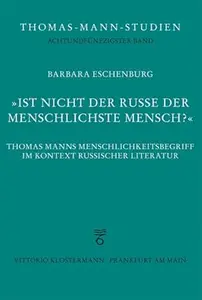
Free Download Barbara Eschenburg, "Ist Nicht Der Russe Der Menschlichste Mensch?: Thomas Manns Menschlichkeitsbegriff Im Kontext Russischer Literatur"
Deutsch | 2022 | ISBN: 346502818X | PDF | pages: 333 | 2.5 mb
Ist nicht der Russe der menschlichste Mensch?" Thomas Mann stellt diese Frage in seinem umstrittenen Essay "Betrachtungen eines Unpolitischen". Es dient zunachst der Polarisierung gegen Frankreich, "den Russen" so als Vorbild fur Menschlichkeit hinzustellen. Doch uber diese Zeitgebundenheit hinaus wird hier auch ein Bild von Menschlichkeit evoziert, das Thomas Manns Werk bis zum "Doktor Faustus" begleitet und sich in besonderem Masse aus seinem Blick auf zwei russische Schriftsteller speist: Dostojewski und Tolstoi. Dostojewskis Verantwortungsideen sowie Tolstois sozialrevolutionare Vorstellungen sind es unter anderem, die Manns Entwicklung von einem individualistischen Menschlichkeitsbegriff hin zu einem sozialen Humanismus pragen. Barbara Eschenburg findet in ihrer Arbeit Anknupfungspunkte ausgewahlter Werke Tolstois und Dostojewskis zu Thomas Manns Romanen und Essays – vom "Zauberberg" uber "Joseph und seine Bruder" bis hin zum "Doktor Faustus". "Is not the Russian the most human of men?" is the question Thomas Mann asks in his controversial essay "Betrachtungen eines Unpolitischen". At this point, it serves to polarize against France in order to present "the Russian" as a model of humanity by contrast. But it also invokes an image of humanity that goes beyond its temporal context, accompanying Thomas Mann’s work up to "Doktor Faustus" and informed in particular by his view of two Russian writers: Dostoevsky and Tolstoy. Among other aspects, it is Dostoevsky’s ideas of responsibility and Tolstoy’s social revolutionary ideas that play a prominent role in shaping Mann’s development from an individualistic concept of humanity towards a social humanism. In her book, Barbara Eschenburg finds points of contact between selected works by Tolstoy and Dostoyevsky and Thomas Mann’s novels and essays – from "Der Zauberberg" to "Joseph und seine Bruder" and "Doktor Faustus".